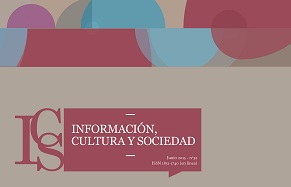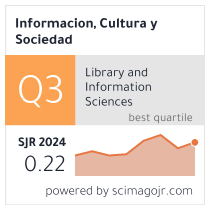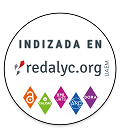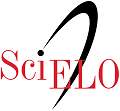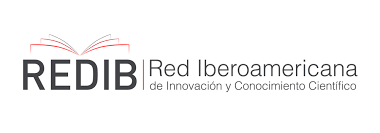Disinformation and Misinformation, Post-truth and fake news: conceptual precisions, differences, similarities and juxtapositions
Abstract
Through the documentary review, based on the qualitative and interpretative approach, the present work intends to recount the main terms currently used in information management: disinformation, misinformation, post-truth and fake news. Terms that demonstrate the relevance that the information obtained through social networks has acquired and that, consequently, generate an informative disorder. This is possible due to the exponential growth of information in an environment subject to the development of information and communication technologies (ICT), where the veracity of it is constantly questioned and as a result its value is lost and it makes the choice of truthful and correct information increasingly difficult. The results allow conceptual clarifications, identify existing relationships of similarity, differences and juxtaposition in each of the terms that have emerged in this context with some examples.Downloads
References
Alexander, James y Jonathan Smith. 2011. Disinformation: A taxonomy. En IEEE Security & Privacy. Vol. 9, no.1, 58-63. <https://doi.org/10.1109/MSP.2010.141>
Bradbury, Ray. 1953. Fahrenheit 451. New York: Ballantine Books.
Brenner, Joseph E. 2010. A Logic of Ethical Information. En Knowledge, Technology & Policy. Vol. 23, no. 1-2, 109-133. <https://doi.org/10.1007/s12130-010-9099-3>
Britz, Johannes J. 2008. Making the global information society good: A social justice perspective on the ethical dimensions of the global information society. En Journal of the American Society for Information Science and Technology. Vol. 59, no. 7, 1171-1183. <https://doi.org/10.1002/asi.20848>
Byron, Michael. 2010. Floridi's Fourth Revolution and the Demise of Ethics. En Knowledge, Technology & Policy. Vol. 23, no. 1-2, 135-147. <https://doi.org/10.1007/s12130-010-9103-y>
Cambridge Dictionary. 2018. Misinformation. <https://dictionary.cambridge.org/es/diccionario/ingles/misinformation> [Consulta: 11 diciembre 2018].
Carbo, Toni y Stephen Almagno. 2001. Information ethics: The duty, privilege and challenge of educating information professionals. En Library Trends. Vol. 49, no. 3, 510-518. <http://hdl.handle.net/2142/8351> [Consulta: 23 setiembre 2018].
Carlson, Matt. 2020. Fake news as an informational moral panic: the symbolic deviancy of social media during the 2016 US presidential election. En Information, Communication & Society. Vol. 23, no. 3, 374-388. <https://doi.org/10.1080/1369118X.2018.1505934>
Cooke, Nicole A. 2017. Posttruth, Truthiness, and Alternative Facts: Information Behavior and Critical Information Consumption for a New Age. En The Library Quarterly. Vol. 87, no. 3, 211-221. <https://doi.org/10.1086/692298>
Del-Fresno-García, Miguel. 2019. Desórdenes informativos: sobreexpuestos e infrainformados en la era de la posverdad. En El profesional de la información. Vol. 28, no. 3, 1-11. <https://doi.org/10.3145/epi.2019.may.02>
Doomen, Jasper. 2009. Information Inflation. En Journal of Information Ethics. Vol. 18, no. 2, 27-37. <https://doi.org/10.3172/JIE.18.2.27>
Durandin, Guy. 1983. La mentira en la propaganda política y en la publicidad. Barcelona: Paidós.
Durandin, Guy. 1995. La información, la desinformación y la realidad. Barcelona: Paidós.
Estrada-Cuzcano, Alonso y Valeria Saavedra-Vásquez. 2018. The Legal and Ethical Basis of Intellectual Freedom. En Journal of Information Ethics. Vol. 27, no. 1, 31-42.
Fallis, Don. 2014. Epistemic Values and Disinformation. En Fairweather, Abrol, ed. Virtue Epistemology Naturalized: Bridges Between Virtue Epistemology and Philosophy of Science. Cham: Springer International Publishing. p. 159-179. <https://doi.org/10.1007/978-3-319-04672-3_10>
Fallis, Don. 2015. What Is Disinformation? En Library Trends. Vol. 63, no. 3, 401-426. <https://doi.org/10.1353/lib.2015.0014>
Fallis, Don. 2016. Mis- and dis-information. En Floridi, Luciano, ed. The Routledge Handbook of Philosophy of Information. Oxfordshire: Routledge. p. 332-346. <https://doi.org/10.4324/9781315757544.ch27>
Fetzer, James H. 2004a. Disinformation: The use of false information. En Minds and Machines. Vol. 14, no. 2, 231-240. <https://doi.org/10.1023/B:MIND.0000021683.28604.5b>
Fetzer, James H. 2004b. Information: Does it have to be true? En Minds and Machines. Vol. 14, no. 2, 223-229. <https://doi.org/10.1023/B:MIND.0000021682.61365.56>
Filloux, Frederic. 2018. Fighting fake news is a losing battle, but there are other ways to win the war. En Monday Note. 6 de agosto 2018. <https://mondaynote.com/fighting-fake-news-is-a-losing-battle-but-there-are-other-ways-to-win-the-war-1991ed877478> [Consulta: 12 enero 2019].
Floridi, Luciano. 2006. Ética de la información: su naturaleza y alcance. En Isegoría. No. 34, 19-46. <https://doi.org/10.3989/isegoria.2006.i34.2>
Floridi, Luciano y Mariarosaria Taddeo. 2016. What is data ethics? En Philosophical Transactions of the Royal Society A: Mathematical, Physical and Engineering Sciences. Vol. 374, no. 2083, 1-5. <https://doi.org/10.1098/rsta.2016.0360>
Goldmann, Lucien. 1966. Importancia del concepto de conciencia posible para la comunicación. En Coloquios Royaumont. El concepto de la información en la ciencia contemporánea. México, D.F.: Siglo XXI. p. 31-41.
Habgood-Coote, Joshua. 2018. Stop talking about fake news! En Inquiry. Vol. 62, no. 9-10, 1-33. <https://doi.org/10.1080/0020174X.2018.1508363>
Hofkirchner, Wolfgang. 2010. How to Design the Infosphere: the Fourth Revolution, the Management of the Life Cycle of Information, and Information Ethics as a Macroethics. En Knowledge, Technology, & Policy. Vol. 23, no. 1-2, 177-192. <http://dx.doi.org/10.1007/s12130-010-9108-6>
Hongladarom, Soraj. 2008. Floridi and Spinoza on global information ethics. En Ethics and Information Technology. Vol. 10, no. 2-3, 175-187. <http://dx.doi.org/10.1007/s10676-008-9164-8>
Howlett Spence, Edward. 2010. The normative structure of information and its communication. En Journal of Information, Communication and Ethics in Society. Vol. 8, no. 2, 150-163. <http://dx.doi.org/10.1108/14779961011040569>
Morales Campos, Estela. 2018. Desinformación en la Sociedad de la Información y el Conocimiento. En Morales Campos, Estela, ed. La posverdad y las noticias falsas: el uso ético de la información. México, D.F.: UNAM, Instituto de Investigaciones Bibliotecológicas y de la Información.
Nogués, Guadalupe. 2018. Creencias y emociones ¿Cómo nos afectan las emociones a la hora de interpretar los hechos? En Nogués, Guadalupe, ed. Pensar con Otros: Una guía de supervivencia en tiempos de posverdad. Buenos Aires: El Gato y La Caja. <https://elgatoylacaja.com.ar/pensar-con-otros/capitulo-5/> [Consulta: 15 marzo 2020].
Orwell, George. 2016. 1984. México, D.F.: Tomo.
Oxford-Dictionaries. 2016. Oxford Dictionaries Word of the Year 2016 is… <https://en.oxforddictionaries.com/word-of-the-year/word-of-the-year-2016> [Consulta: 22 diciembre 2018].
RAE. 2016. Diccionario de la lengua española. 23a. <http://dle.rae.es/> [Consulta: 22 diciembre 2018].
Ranganathan, Shiyali Ramamrita. 1931. The five laws of library science. Madras: Madras Library Association; Londres: Edward Goldston.
Stahl, Bernd Carsten. 2008. Discourses on information ethics: The claim to universality. En Ethics and Information Technology. Vol. 10, no. 2-3, 97-108. <https://doi.org/10.1007/s10676-008-9171-9>
Tandoc, Edson C., Zheng Wei Lim y Richard Ling. 2018. Defining "Fake News". En Digital Journalism. Vol. 6, no. 2, 137-153. <https://doi.org/10.1080/21670811.2017.1360143>
Turilli, Matteo y Luciano Floridi. 2009. The ethics of information transparency. En Ethics and Information Technology. Vol. 11, no. 2, 105-112. <https://doi.org/10.1007/s10676-009-9187-9>
Van der Veer Martens, Betsy. 2015. An Illustrated Introduction to the Infosphere. En Library Trends. Vol. 63, no. 3, 317-361. <https://doi.org/110.1353/lib.2015.0006>
Wardle, Claire y Hossein Derakhshan. 2017. Information Disorder: Toward an interdisciplinary framework for research and policy making. Strasbourg: Council of Europe. <https://rm.coe.int/information-disorder-toward-an-interdisciplinary-framework-for-researc/168076277c> [Consulta: 17 noviembre 2018].
Zarzalejos, José Antonio. 2017. Comunicación, periodismo y 'fact-checking'. En Uno. No. 27, 11-13. <http://www.revista-uno.com/wp-content/uploads/2017/03/UNO_27.pdf> [Consulta: 29 noviembre 2018].
Authors publishing in this journal acknowledge the conditions below:
- Authors retain the copyright of their work while they transfer the right of the first publishing to the journal, under the Creative Commons Attribution-ShareAlike 4.0 International (CC BY-SA 4.0) Licence, which allows third parties to reproduce them under the condition that express mention is given to the author and to its original publication in the journal.
- Authors may enter into other contractual and independent arrangements for the non-exclusive distribution of the version of the article published in this journal (for instance, it can be published in an institutional repository or in a book). In any case, an express mention should be given to its first publication in the journal.
- It is permitted and encouraged to publish online the articles (for example, on institutional or personal pages).
